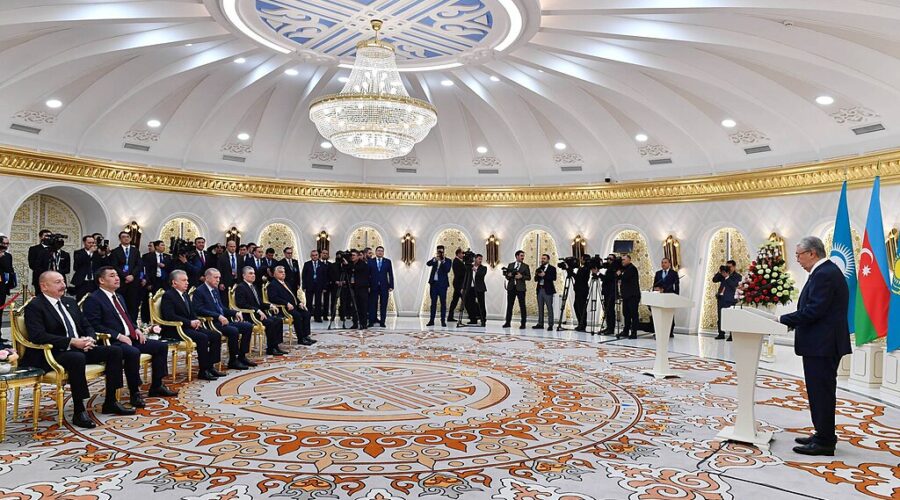While the world’s eyes remain focused on Israel’s war against Hamas – and to a lesser extent on the Russian invasion of Ukraine – Turkey is seeking to achieve some of its strategic goals in the post-Soviet space. Ankara seems determined to strengthen its positions in the South Caucasus and Central Asia – regions that have traditionally been in Russia’s geopolitical orbit.
Following the summit of the Organization of the Turkic States (OTS) held in Kazakhstan’s capital city of Astana on November 3, it became obvious that Turkey plans to continue pursuing its pan-Turkic Eurasian foreign policy. The fact that Turkish President Recep Erdogan emphasized the significance of “adopting a unified alphabet for Turkic nations” indicates that Ankara sees the OTS (whose members are Turkey, Azerbaijan, Kazakhstan, Kyrgyzstan, and Uzbekistan) as an instrument that will allow it to position itself as a leader of the Turkic world.
But the problem for Turkish policy makers is the fact that all OTS members (excluding Turkey) are former Soviet republics that are still in Russia’s zone of influence. Thus, in order to increase its presence in countries such as Kyrgyzstan, Kazakhstan, and Uzbekistan, Ankara will first have to find a way to crowd Moscow out of Central Asia.
Meanwhile, Turkey will likely seek to incorporate energy-rich Turkmenistan into the OTS. Despite being an observer-state, to this day Turkmenistan has not become a full-fledged member of the Organization of Turkic States, even though Ankara is in favor of Ashgabat’s membership. Turkish leadership also hopes that the OTS nations will eventually recognize the self-proclaimed Turkish Republic of Northern Cyprus (TRNC), a move that would allow the Ankara-backed entity to formally join the club.
“I believe that at our next summit, we will see the Turkish Republic of Northern Cyprus among us as an observer member, as we have decided”, said Erdogan on November 3, referring to the OTS 2022 decision to admit the self-proclaimed republic to the Turkey-dominated organization as an observer member.
Unlike at the previous OTS summit in Ankara in March, where the Turkish-Cypriot leader Ersin Tatar was treated like all other heads of states, and the TRNC flags were everywhere, in Astana there was no official presence of the Turkish Republic of Northern Cyprus representatives. Such an outcome came as a no surprise, given that in June 2022 Kazakhstan’s President Kassym-Jomart Tokayev clearly stated that if the right of nations to self-determination is actually realized, “instead of the 193 states that are now members of the United Nations, more than 500 or 600 states would emerge on Earth”, and that would, in his opinion, “create chaos”.
Therefore, even though the summit in Astana was held under the moto TURKTIME – standing for Traditions, Unification, Reforms, Knowledge, Trust, Investments, and Mutual Energy – it seems that the OTS members and observer states still have very different views on some crucial geopolitical matters. That, however, does not prevent the Turkic nations to continue strengthening economic ties.
According to Omer Kocaman, the OTS deputy secretary general, the trade volume within the group has already topped some $40 billion. Azerbaijan-based political analyst Ilgar Velizade claims that, in the coming years, the Organization of Turkic States will “not only become a platform for peace and cooperation of regional and global significance, but also one of the world centers of economic growth.” On the other hand, Edil Marlis Uulu, leader of the International Public Association “Congress of Turkic Peoples”, insists that the OTS will become “a significant political figure”.
“I can assume that, over time, countries such as South Korea and Japan may become members of the Organization of the Turkic States”, the Kyrgyzstan-based expert stressed, despite the fact that the two Asian nations are not Turkic.
But neither is Hungary, although that did not prevent Budapest from becoming an OTS observer in 2018. Upon arrival to Astana, Hungarian Prime Minister Viktor Orban said that it’s “always nice to come home”, even though it is rather questionable if Hungarians and Kazakhs share the same origin. Orban, however, subscribes to a pseudoscientific cultural movement – Hungarian Turanism – contending Hungarians are descended from Turkic Central Asians. Such a narrative allows Budapest to develop close ties with the OTS – an entity that still primarily serves as a platform for dialogue, although it does have capacity to increase its importance in the international arena.
Turkey, as the most powerful actor in the group, seeks to position itself as a “patron of Turkic-speaking peoples”, as that would help Ankara strengthen its influence not only in the OTS nations, but also among Turkic peoples living in Russia, including Crimean Tatars – the ethnic group indigenous to the Crimean Peninsula that Moscow annexed from Ukraine in 2014. Moscow, on the other hand, is struggling to preserve its nominal allies such as Kazakhstan and Kyrgyzstan in its orbit, while the fate of Russia’s “ethnic republics”, where Turkic people make up the majority of the population, will likely depend on the outcome of the Kremlin’s adventure in Ukraine.
For the time being, the Turkic-speaking Central Asian and South Caucasus nations are expected to stay in the Russian-dominated Commonwealth of Independent States, and preserve relatively strong economic ties with Moscow, although they will almost certainly continue deepening their integration into Ankara’s Turkic-world project.
Image: Press Service of the President of the Republic of Azerbaijan

